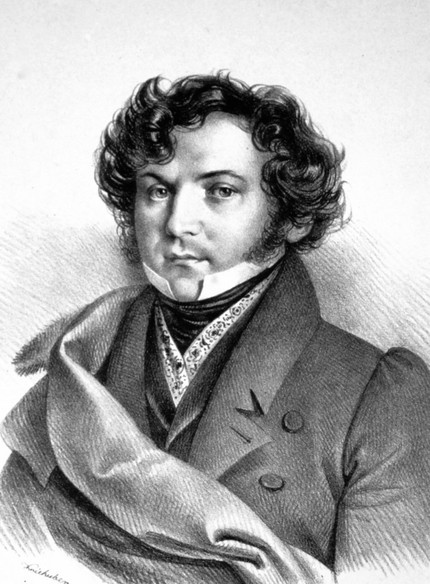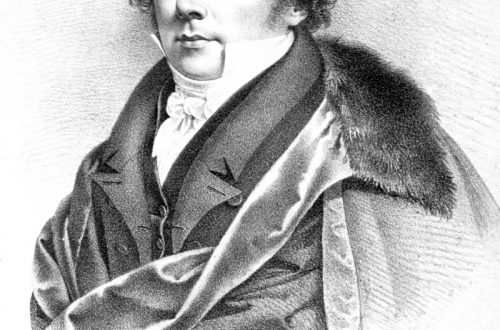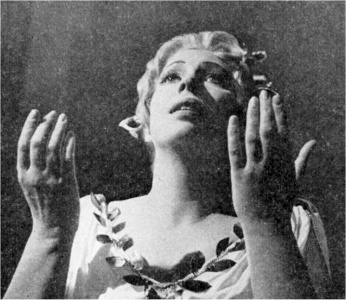
Giovanni Battista Rubini |
Giovanni Battista Rubini

One of the connoisseurs of the vocal art of the XNUMXth century, Panovka, writes about Rubini: “He had a strong and courageous voice, but he owes this not so much to the strength of sound as to the sonority of vibration, to the metallic timbre. At the same time, his voice was exceptionally elastic and mobile, like a lyric soprano. Roubini easily took the upper soprano notes and at the same time confidently and clearly intoned.
But the opinion about the singer V.V. Timokhin. “First of all, the singer delighted the audience with an exceptionally beautiful voice of a wide range (chest register from “mi” of a small octave to “si” of the first octave), brightness, purity and brilliance of his performance. With great skill, the tenor used a superbly developed upper register (Rubini could take “fa” and even “salt” of the second octave). He resorted to falsetto not in order to hide any shortcomings in the “chest notes”, but with the sole purpose of “diversifying human singing through contrasts, expressing the most important shades of feelings and passions,” as one of the reviews indicated. “It was a rich, inexhaustible spring of new, all-powerful effects.” The singer’s voice conquered with flexibility, juicy, velvety shade, sound, smooth transitions from register to register. The artist had a remarkable ability to emphasize the contrasts between forte and piano.
Giovanni Battista Rubini was born on April 7, 1795 in Romano in the family of a local music teacher. As a child, he did not show great success in teaching and his voice did not cause delight among the listeners. Giovanni’s musical studies themselves were unsystematic: the organist of one of the nearest small villages gave him lessons in harmony and composition.
Roubini began as a singer in churches and as a violinist in theater orchestras. At the age of twelve, the boy becomes a chorister in a theater in Bergamo. Then Rubini got into the troupe of a traveling opera company, where he had a chance to go through a harsh school of life. In order to earn a living, Giovanni undertakes a concert tour with one violinist, but nothing came of the idea. In 1814, he was given a debut in Pavia in the opera Tears of the Widow by Pietro Generali. Then followed an invitation to Brescia, to the carnival of 1815, and then to Venice, to the rather famous San Moise theater. Soon the singer entered into an agreement with the powerful impresario Domenico Barbaia. He helped Rubini to take part in the performances of the Neapolitan theater “Fiorentini”. Giovanni happily agreed – after all, such a contract allowed, among other things, to study with the largest singers in Italy.
At first, the young singer was almost lost in the constellation of talents of the Barbaia troupe. Giovanni even had to agree to a pay cut. But perseverance and studies with the famous tenor Andrea Nozari played their role, and soon Rubini became one of the main decorations of the Neapolitan opera.
For the next eight years, the singer performed with great success on the stages of Rome, Naples, Palermo. Now Barbaia, in order to keep Rubini, goes to increase the singer’s fee.
On October 6, 1825, Roubini made his debut in Paris. At the Italian Opera, he first sang in Cinderella, and then in The Lady of the Lake and Othello.
The role of Otello Rossini specially rewrote for Rubini – after all, he originally created it based on the low voice of Nozari. In this role, the singer showed his ability to highlight sometimes subtle details, to give the whole image an amazing integrity and truthfulness.
With what sadness, with what pain of a heart wounded by jealousy, the singer spent the tense final scene of the third act with Desdemona! “The motif of this duet ends in a rather complex and lengthy roulade: here we could fully appreciate all the art, all the deep musical feeling of Rubini. It would seem that any grace in singing, full of passion, should cool his action – it turned out the other way around. Roubini managed to give so much strength, so much dramatic feeling to an insignificant roulade, that this roulade deeply shocked … listeners, ”wrote one of his contemporaries after the artist’s performance in Othello.
The French public unanimously recognized the Italian artist as the “King of Tenors”. After six months of triumphs in Paris, Rubini returned to his homeland. Having performed in Naples and Milan, the singer went to Vienna.
The first successes of the singer are associated with performances in Rossini’s operas. It would seem that the composer’s style is virtuoso brilliant, full of liveliness, energy, temperament, best of all corresponds to the character of the artist’s talent.
But Rubini conquered his heights in collaboration with another Italian composer, Vincenzo Bellini. The young composer opened a new fascinating world for him. On the other hand, the singer himself contributed a lot to the recognition of Bellini, being the most subtle spokesman of his intentions and an incomparable interpreter of his music.
For the first time, Bellini and Rubini met while preparing for the premiere of the opera The Pirate. Here is what F. Pastura writes: “… With Giovanni Rubini, he decided to take it seriously, and not so much because the soloist had to sing the title part of Gualtiero, the composer wanted to teach him how to embody exactly the image that he painted in his music. And he had to work hard, because Rubini just wanted to sing his part, and Bellini insisted that he also play his part. One thought only about the emission of sound, about the production of voice and other tricks of vocal technique, the other sought to make him an interpreter. Rubini was only a tenor, but Bellini wanted the singer to become, first of all, a concrete character, “seized with passion.”
Count Barbeau witnessed one of the many clashes between author and performer. Rubini came to Bellini to rehearse his vocal line in the duet of Gualtiero and Imogen. Judging by what Barbeau says, it was apparently a duet from the first act. And the alternation of simple phrases, devoid of any vocal embellishments, but intensely agitated, did not find any echo in the soul of the singer, who was accustomed to conventional numbers, sometimes more difficult, but certainly effective.
They went through the same fragment several times, but the tenor could not understand what the composer needed, and did not follow his advice. In the end, Bellini lost patience.
– You’re an ass! he declared without any embarrassment to Rubini and explained: “You don’t put any feeling into your singing!” Here, in this scene, you could shake the whole theater, and you are cold and soulless!
Rubini remained silent in confusion. Bellini, having calmed down, spoke softer:
– Dear Rubini, what do you think, who are you – Rubini or Gualtiero?
“I understand everything,” the singer replied, “but I cannot pretend to be desperate or pretend to lose my temper with anger.
Only a singer could give such an answer, not a real actor. However, Bellini understood that if he managed to convince Rubini, he would win doubly – both he and the performer. And he made one last attempt: he himself sang the tenor part, performing it the way he wanted. He did not have any special voice, but he knew how to put into it exactly the feeling that helped to give birth to the suffering melody of Gualtiero, who reproached Imogen for infidelity: “Pietosa al padre, e rueco si cruda eri intanto.” (“You took pity on your father, but you were so ruthless with me.”) In this sad cantilena, the passionate, loving heart of a pirate is revealed.
Finally, Rubini felt what the composer wanted from him, and, caught up by a sudden impulse, he added his amazing voice to Bellini’s singing, which now expressed such suffering as no one had ever heard before.
At the premiere of Gualtiero’s cavatina “In the midst of the storm” performed by Rubini caused a storm of applause. “The sensation is such that it is impossible to convey,” writes Bellini, adding that he got up from his seat “as many as ten times to thank the audience.” Roubini, following the advice of the author, performed his part “inexplicably divine, and the singing was surprisingly expressive with all its simplicity, with all the breadth of the soul.” Since that evening, the name of Rubini has been forever associated with this famous melody, so much so that the singer managed to convey its sincerity. Florimo will write later: “Whoever has not heard Rubini in this opera is unable to understand to what extent Bellini’s melodies can excite …”
And after the duet of unfortunate heroes, the very one that Bellini taught Rubini to perform with his weak voice, caused in the hall “such a storm of applause that they looked like an infernal roar.”
In 1831, at the premiere in Milan of another opera, La sonnambula by Bellini, Pasta, Amina, struck by the naturalness and emotional power of Rubini’s performance, began to cry in front of the audience.
Rubini did a lot to promote the work of another composer, Gaetano Donizetti. Donizetti achieved his first major success in 1830 with the opera Anne Boleyn. At the premiere, Rubini sang the main part. With an aria from the second act, the singer made a real sensation. “Whoever has not heard this great artist in this excerpt, full of grace, dreaminess and passion, [he] cannot form an idea of the power of singing art,” the music press wrote in those days. Rubini owes much to the extraordinary popularity of Donizetti’s operas Lucia di Lammermoor and Lucrezia Borgia.
After Rubini’s contract with Barbaia ended in 1831, for twelve years he graced the Italian opera troupe, performing in Paris in the winter and in London in the summer.
In 1843, Roubini made a joint trip with Franz Liszt to Holland and Germany. In Berlin, the artist sang at the Italian Opera. His performance created a real sensation.
In the same spring, the Italian artist arrived in St. Petersburg. First he performed in St. Petersburg and Moscow, and then again sang in St. Petersburg. Here, in the building of the Bolshoi Theater, he showed himself, playing in all his splendor in Othello, The Pirate, La sonnambula, The Puritans, Lucia di Lammermoor.
Here is what V.V. Timokhin: “The greatest success was expected by the artist in Lucia: the audience was excited to the core, and literally the whole audience could not help crying, listening to the famous“ curse scene ”from the second act of the opera. “Pirate”, staged a few years before Rubini’s arrival with the participation of German singers, did not attract any serious attention of St. Petersburg musicians, and only the talent of the Italian tenor restored the reputation of Bellini’s work: in it the artist showed himself to be both an unsurpassed virtuoso and a singer who deeply captivated listeners , according to contemporaries “with a captivating feeling and charming grace …”.
Before Rubini, no operatic artist in Russia aroused such delight. The exceptional attention of the Russian audience prompted Roubini to come to our country in the autumn of that year. This time P. Viardo-Garcia and A. Tamburini came with him.
In the 1844/45 season, the great singer said goodbye to the opera stage. Therefore, Rubini did not take care of his voice and sang as in his best years. The theatrical career of the artist ended in St. Petersburg in “Sleepwalker”.





